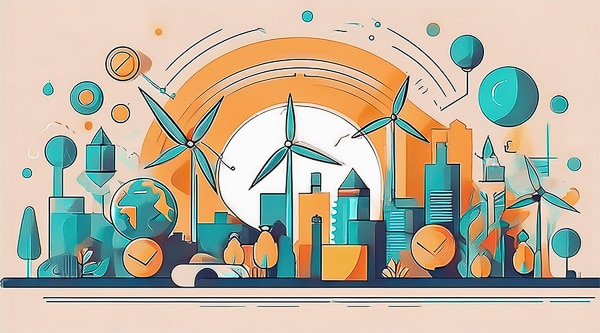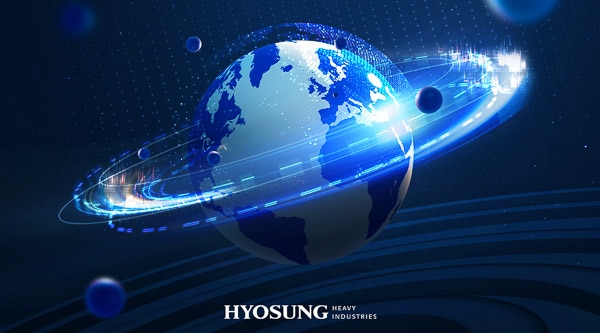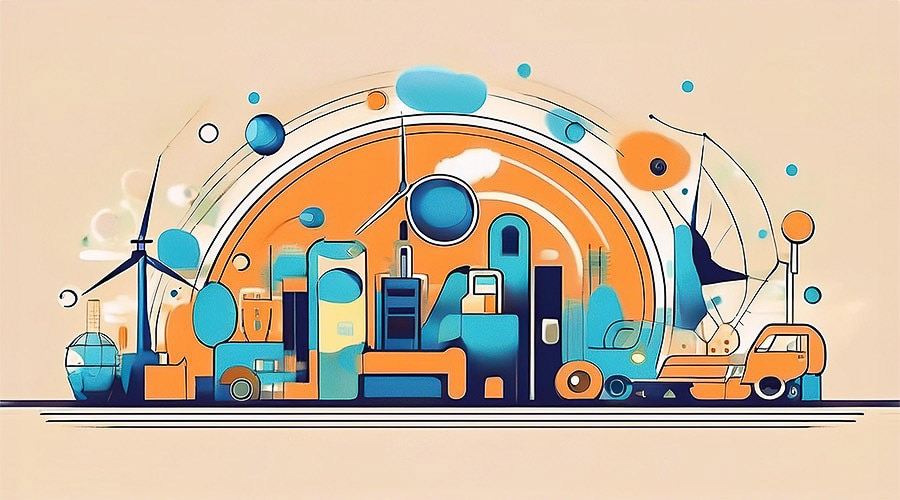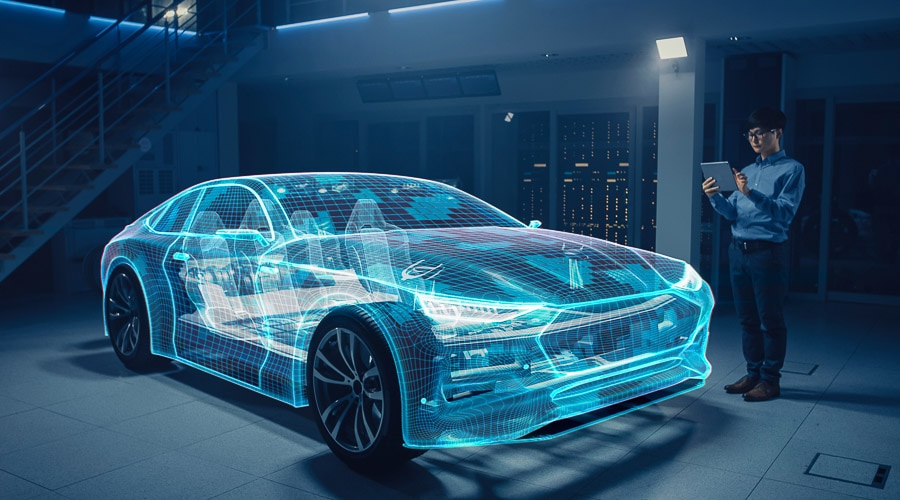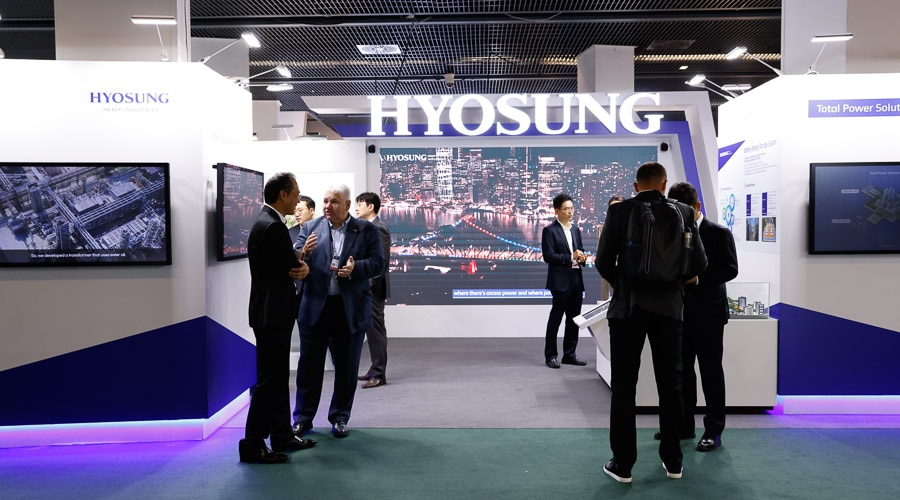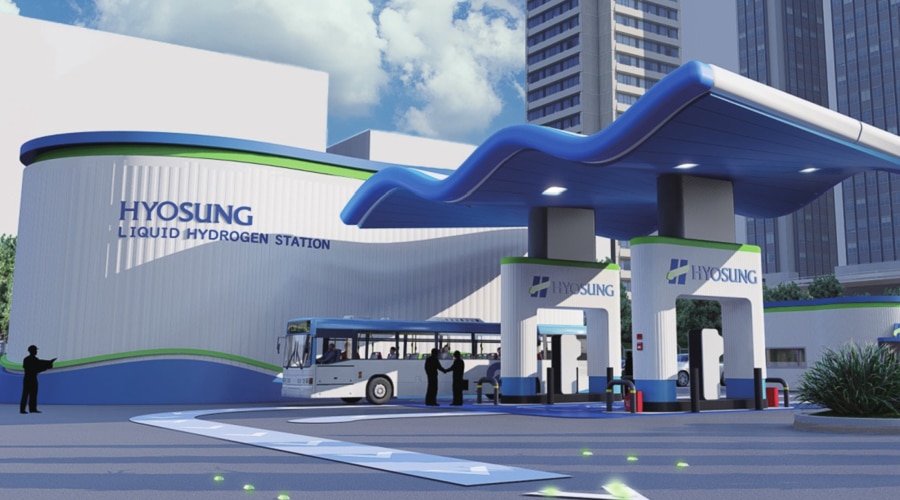Content content
Response to Climate Crisis: HYOSUNG Responds to the Climate Crisis with Recycling and Smart Technology
In 2024, South Korea experienced extreme heat waves. Seoul recorded its highest temperature in 85 years at 34.6°C in September, and Jeju Island endured 65 consecutive days of tropical nights, causing the entire country to simmer. The issue is that extreme weather events, such as heatwaves, are occurring more frequently and taking different forms, such as heavy snow or cold waves. This is not just a problem for Korea.
In Greece, large-scale wildfires broke out, burning vast forests, and in Kenya, severe floods forced many people to flee or led to loss of life. South Asia and Southeast Asia experienced record-breaking heatwaves, and power usage surged in countries like India and Thailand. These phenomena are becoming more frequent and intense as global warming worsens, impacting not only the environment but also the global economy and society at large.
Time to Go Beyond Legal Requirements and Take Environmental Responsibility
Climate change is having severe impacts beyond natural disasters, affecting the economy and the international community as a whole. Businesses have indirectly and directly contributed to the issue through greenhouse gas emissions and abuse of natural resources. Companies from developed countries have emitted so much carbon that they now find themselves in a position where they must reduce their carbon emissions on their own. There are even disputes between developed and developing countries over carbon emissions.
While many companies have strengthened their ESG (Environmental, Social, and Governance) management to respond to climate change in recent years, there has been little practical change, and the climate still remains unpredictable. The climate crisis affects human survival, so businesses must go beyond legal requirements and fulfill their environmental responsibilities. They must establish concrete goals and strategies to reduce greenhouse gas emissions. It is also essential to minimize environmental impacts through the adoption of renewable energy and the development of eco-friendly technologies. The climate crisis is critical not only for businesses to fulfill their social responsibilities but also to sustain continuous growth.
As the seriousness of climate change becomes a global issue, HYOSUNG is actively engaged in greenhouse gas reduction and green technology development to fulfill its social responsibilities and contribute to a sustainable future.
Responding to the Climate Crisis through Carbon Emission Reduction and Energy Efficiency
HYOSUNG has set a clear goal to reduce greenhouse gas emissions by 23.6% by 2030 compared to 2018 levels. This target is an upward revision from the previous 14.5% reduction plan, demonstrating HYOSUNG’s commitment to addressing climate change more responsibly and swiftly. In fact, HYOSUNG reduced its greenhouse gas emissions by 6.4% in 2023 compared to the previous year through process improvements and energy efficiency initiatives.
HYOSUNG Co., Ltd. Greenhouse Gas Emissions and 2030 Emission Reduction Target
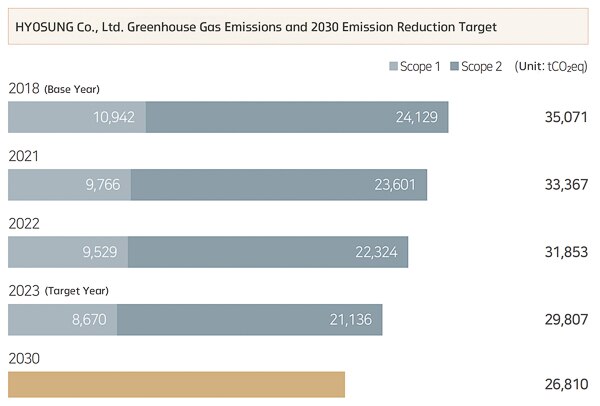
▲ HYOSUNG Co., Ltd. Greenhouse Gas Emissions and 2030 Emission Reduction Target (Source: 2023 Sustainability Report)
HYOSUNG’s smart factories maximize energy efficiency and reduce greenhouse gas emissions. At the Anyang plant in 2023, the voltage of transformers was adjusted to reduce power loss in wires, resulting in energy savings. In 2024, the company plans to further reduce greenhouse gas emissions by 800 tons annually through the replacement of high-efficiency pumps and the installation of boiler waste heat recovery devices.
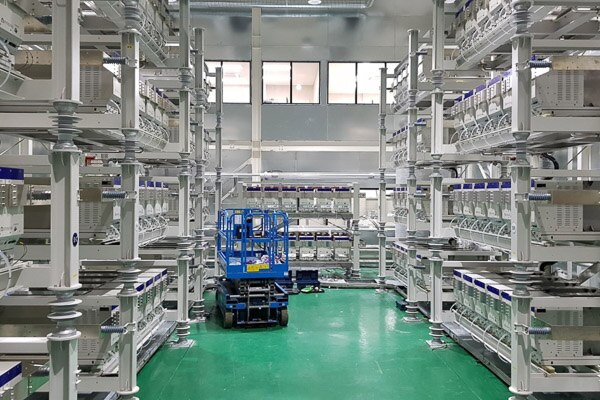
▲ 20MW Voltage Source HVDC Link Project for Offshore Wind Power in Jeju
To expand the use of renewable energy, HYOSUNG has introduced smart grid technologies such as HVDC (High Voltage Direct Current) and MVDC (Medium Voltage Direct Current) systems. Smart grid technology is a next-generation power grid system that integrates information and communication technology with existing power networks to efficiently manage and optimize power supply and demand. This technology allows real-time monitoring and control of power production, transmission, distribution, and consumption, minimizing power loss and maximizing the use of renewable energy.
Continuous Carbon Emission Reduction with Bio-Based Materials
HYOSUNG is focused on developing sustainable products that consider the environment. The regen product line consists of fibers made from recycled resources and bio-based materials that reduce carbon emissions. Notably, regen Ocean Nylon is made from recycled fishing nets, and regen Polyester is made from recycled PET bottles. regen recycled fibers reduce the use of petroleum-based raw materials and minimize carbon emissions, leading the way in the sustainable textile industry.
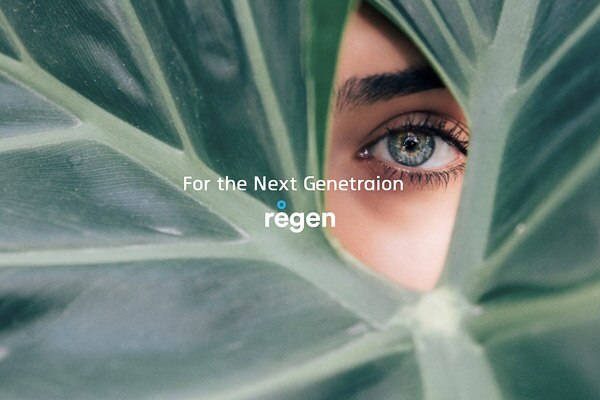
▲ For the Next Generation, regen
regen BIO Spandex, a bio-based fiber, reduces carbon emissions during its production process by using fermentation technology from natural resources instead of petrochemical materials. This product maintains the performance of spandex while being recognized as a sustainable material, playing a crucial role in the sustainable fashion industry.
Additionally, HYOSUNG is addressing the physical risks posed by climate change. To prepare for extreme weather events such as typhoons and floods, the company is reinforcing equipment and enhancing safety inspections at its facilities. Flood prevention measures are being implemented, minimizing damage to the facilities and surrounding areas.
Climate Change: An Urgent Issue That Cannot Be Delayed
Climate change is no longer a distant issue; it is a current problem, and the response to it cannot be postponed. Companies must recognize their impact on climate change and fulfill their social responsibilities through sustainable management. HYOSUNG is directly practicing how businesses can respond to environmental issues with clear goals and strategies. It is time for individuals, companies, organizations, and nations—indeed, the entire world—to take action for our one and only planet.
